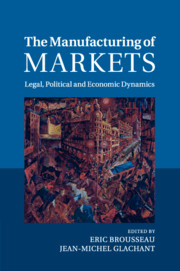51 results
Part VI - The daily adjustment of market technology
-
- Book:
- The Manufacturing of Markets
- Published online:
- 05 July 2014
- Print publication:
- 22 May 2014, pp 353-469
-
- Chapter
- Export citation
Copyright page
-
- Book:
- The Manufacturing of Markets
- Published online:
- 05 July 2014
- Print publication:
- 22 May 2014, pp vi-vi
-
- Chapter
- Export citation
Index
-
- Book:
- The Manufacturing of Markets
- Published online:
- 05 July 2014
- Print publication:
- 22 May 2014, pp 512-523
-
- Chapter
- Export citation
Part V - The challenge of balancing public and private ordering
-
- Book:
- The Manufacturing of Markets
- Published online:
- 05 July 2014
- Print publication:
- 22 May 2014, pp 289-352
-
- Chapter
- Export citation
Contributors
-
-
- Book:
- The Manufacturing of Markets
- Published online:
- 05 July 2014
- Print publication:
- 22 May 2014, pp xiii-xxii
-
- Chapter
- Export citation
The Manufacturing of Markets - Half title page
-
- Book:
- The Manufacturing of Markets
- Published online:
- 05 July 2014
- Print publication:
- 22 May 2014, pp i-iv
-
- Chapter
- Export citation

The Manufacturing of Markets
- Legal, Political and Economic Dynamics
-
- Published online:
- 05 July 2014
- Print publication:
- 22 May 2014
Part II - Path dependency and political constraints in establishing property rights systems
-
- Book:
- The Manufacturing of Markets
- Published online:
- 05 July 2014
- Print publication:
- 22 May 2014, pp 79-142
-
- Chapter
- Export citation
Part I - Public and private complementarities in securing exchange
-
- Book:
- The Manufacturing of Markets
- Published online:
- 05 July 2014
- Print publication:
- 22 May 2014, pp 11-78
-
- Chapter
- Export citation
1 - Introduction
-
-
- Book:
- The Manufacturing of Markets
- Published online:
- 05 July 2014
- Print publication:
- 22 May 2014, pp 1-10
-
- Chapter
- Export citation
Part III - The political origin of competition
-
- Book:
- The Manufacturing of Markets
- Published online:
- 05 July 2014
- Print publication:
- 22 May 2014, pp 143-222
-
- Chapter
- Export citation
Contents
-
- Book:
- The Manufacturing of Markets
- Published online:
- 05 July 2014
- Print publication:
- 22 May 2014, pp vii-ix
-
- Chapter
- Export citation
Figures
-
- Book:
- The Manufacturing of Markets
- Published online:
- 05 July 2014
- Print publication:
- 22 May 2014, pp x-xi
-
- Chapter
- Export citation
Acknowledgments
-
- Book:
- The Manufacturing of Markets
- Published online:
- 05 July 2014
- Print publication:
- 22 May 2014, pp xxiii-xxiv
-
- Chapter
- Export citation
The Manufacturing of Markets - Title page
-
-
- Book:
- The Manufacturing of Markets
- Published online:
- 05 July 2014
- Print publication:
- 22 May 2014, pp v-v
-
- Chapter
- Export citation
Part IV - The myopia of the public hand
-
- Book:
- The Manufacturing of Markets
- Published online:
- 05 July 2014
- Print publication:
- 22 May 2014, pp 223-288
-
- Chapter
- Export citation
References
-
- Book:
- The Manufacturing of Markets
- Published online:
- 05 July 2014
- Print publication:
- 22 May 2014, pp 470-511
-
- Chapter
- Export citation
20 - Conclusion: tâtonnement in the manufacturing of markets
- from Part VI - The daily adjustment of market technology
-
-
- Book:
- The Manufacturing of Markets
- Published online:
- 05 July 2014
- Print publication:
- 22 May 2014, pp 441-469
-
- Chapter
- Export citation
Tables
-
- Book:
- The Manufacturing of Markets
- Published online:
- 05 July 2014
- Print publication:
- 22 May 2014, pp xii-xii
-
- Chapter
- Export citation
3 - Regulating networks in the “new economy”: organizing competition to share information and knowledge
- from Part I - The Evolution of Regulatory Frameworks in Perspective
-
-
- Book:
- Governance, Regulation and Powers on the Internet
- Published online:
- 05 May 2012
- Print publication:
- 23 April 2012, pp 63-92
-
- Chapter
- Export citation

